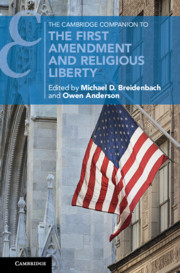Book contents
- The Cambridge Companion to the First Amendment and Religious Liberty
- Cambridge Companions to Law
- The Cambridge Companion to the First Amendment and Religious Liberty
- Copyright page
- Dedication
- Contents
- Notes on Contributors
- Acknowledgments
- Introduction
- Part I Philosophical Foundations
- Part II Historical Interpretations
- 4 Religious Exercise and Establishment in Early America
- 5 The Historical Context of the Religion Clauses of the First Amendment
- 6 Religious Tests, Loyalty Oaths, and the Ecclesiastical Context of the First Amendment
- 7 Church and State in the Nineteenth Century
- 8 The First Amendment Religion Clauses in the United States Supreme Court
- Part III Law, Politics, and Economics
- Index
8 - The First Amendment Religion Clauses in the United States Supreme Court
from Part II - Historical Interpretations
Published online by Cambridge University Press: 17 December 2019
- The Cambridge Companion to the First Amendment and Religious Liberty
- Cambridge Companions to Law
- The Cambridge Companion to the First Amendment and Religious Liberty
- Copyright page
- Dedication
- Contents
- Notes on Contributors
- Acknowledgments
- Introduction
- Part I Philosophical Foundations
- Part II Historical Interpretations
- 4 Religious Exercise and Establishment in Early America
- 5 The Historical Context of the Religion Clauses of the First Amendment
- 6 Religious Tests, Loyalty Oaths, and the Ecclesiastical Context of the First Amendment
- 7 Church and State in the Nineteenth Century
- 8 The First Amendment Religion Clauses in the United States Supreme Court
- Part III Law, Politics, and Economics
- Index
Summary
This chapter examines the U.S. Supreme Court’s landmark First Amendment religious liberty cases to show how the judiciary has come to terms with the disputes that arise over religious liberty. The religion clauses are often seen as upholding the concept of individual rights and defending religious liberty against religious majoritarianism. However, the U.S. Supreme Court’s interpretation of the religion clauses often belies this perception. This chapter demonstrates that the religion clauses largely epitomize majoritarianism. That is, rather than protecting religious minorities, the scope and protection of the religion clauses reflect both the trajectory of the Supreme Court’s broader constitutional rights jurisprudence, as well as the wider political landscape, both as it relates to judicial politics as well as contemporary social discourse.
Keywords
- Type
- Chapter
- Information
- Publisher: Cambridge University PressPrint publication year: 2020
- 2
- Cited by

